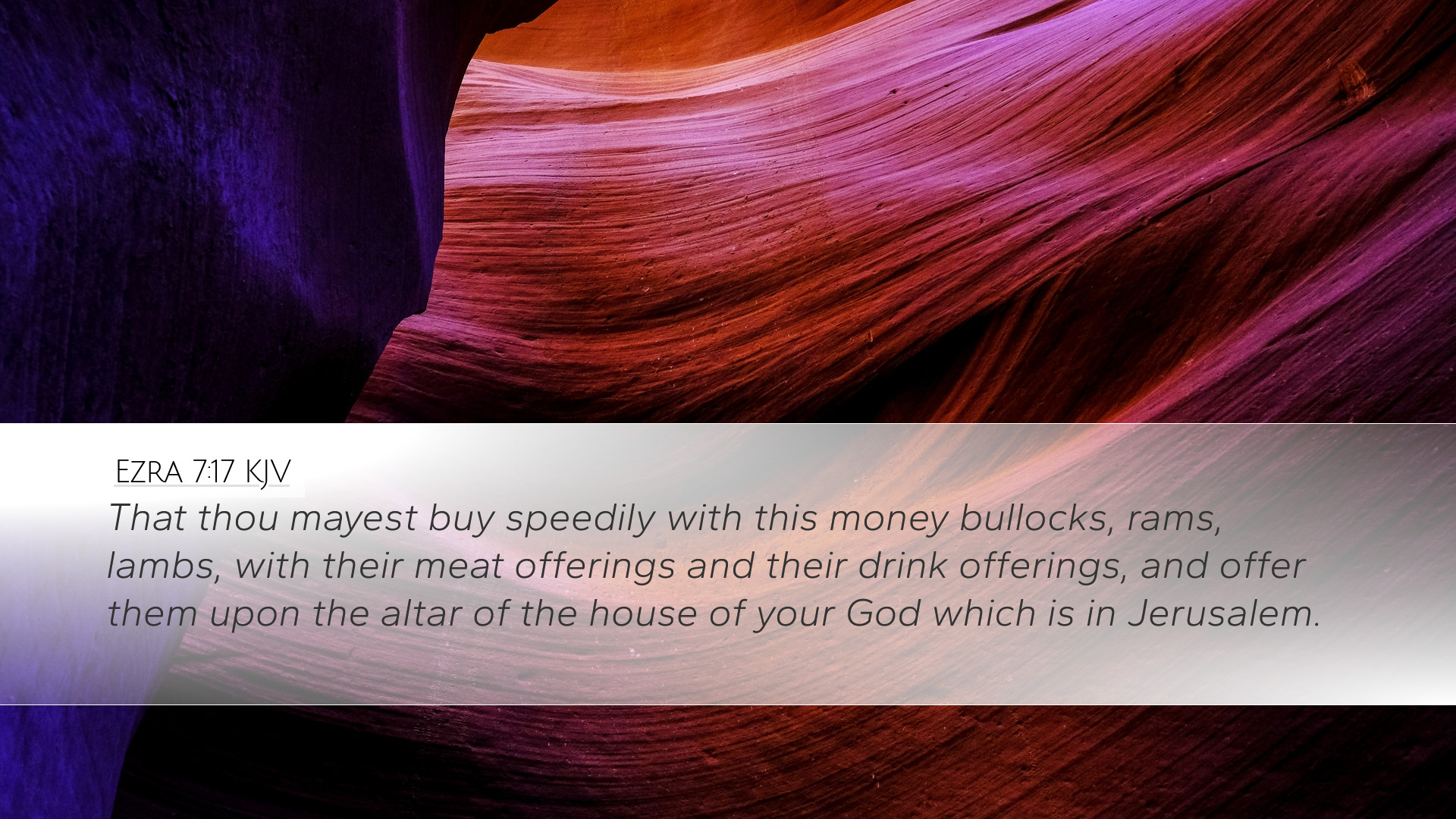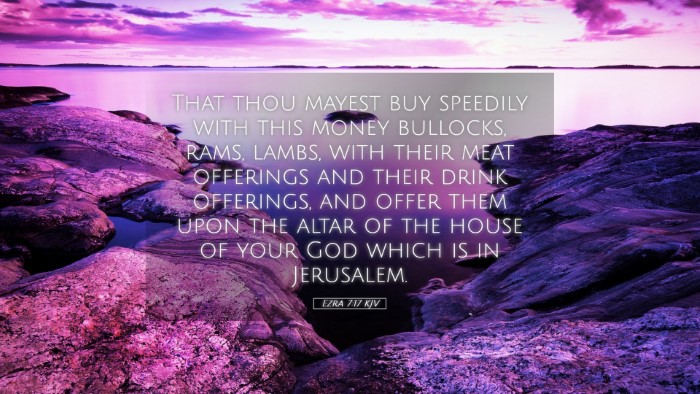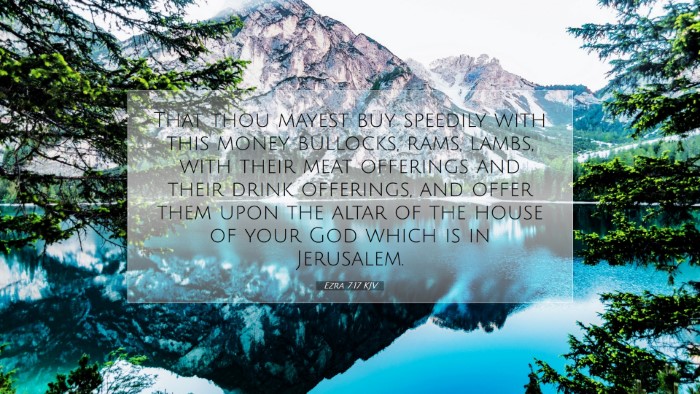Old Testament
Genesis Exodus Leviticus Numbers Deuteronomy Joshua Judges Ruth 1 Samuel 2 Samuel 1 Kings 2 Kings 1 Chronicles 2 Chronicles Ezra Nehemiah Esther Job Psalms Proverbs Ecclesiastes Song of Solomon Isaiah Jeremiah Lamentations Ezekiel Daniel Hosea Joel Amos Obadiah Jonah Micah Nahum Habakkuk Zephaniah Haggai Zechariah MalachiEzra 7:17
Ezra 7:17 KJV
That thou mayest buy speedily with this money bullocks, rams, lambs, with their meat offerings and their drink offerings, and offer them upon the altar of the house of your God which is in Jerusalem.
Ezra 7:17 Bible Commentary
Commentary on Ezra 7:17
Ezra 7:17 (KJV): "That thou mayest buy speedily with this money bullocks, sheep, and lambs, with their meat offerings and their drink offerings, and offer them upon the altar of the house of your God which is in Jerusalem."
Introduction
This passage focuses on the provisions made for sacrificial offerings to God, emphasizing the significance of worship and the restoration of temple practices after the Babylonian exile. The context of Ezra's mission and the resources provided to him by the king serve to highlight God's providence and the commitment of His people to return to worship in Jerusalem.
Historical Context
The book of Ezra details the return of the Jewish exiles from Babylon and the reconstruction of the temple in Jerusalem. Ezra, a priest and scribe, was instrumental in re-establishing the Law and temple worship. This verse comes as part of the letters that King Artaxerxes authorized, which allowed Ezra to lead a group back to Jerusalem and facilitated the needs for sacrificial worship.
Thematic Insights
-
Provision for Worship:
Ezra 7:17 emphasizes the financial and material provisions necessary for ritual sacrifices, indicating that worship requires preparation and resources. As Adam Clarke notes, the offerings involved represent a holistic worship experience, with each part symbolizing devotion to God.
-
The Role of Sacrifice:
Matthew Henry highlights the centrality of sacrifices in the worship of God, underscoring that the offerings of bullocks, sheep, and lambs reflect the serious nature of atonement and the consecration of the people to God. These sacrifices are more than mere rituals; they embody the community's commitment to restoring their covenant relationship with God.
-
Community and Collective Worship:
Ezra is depicted not just as an individual but as a leader of a community returning to their spiritual roots. The collective gathering for worship signifies the importance of community in spiritual rejuvenation, echoing themes found in both contemporary and historical Christian practices.
Commentary Insights
Matthew Henry's Commentary
Matthew Henry comments on how the offerings specified in this verse reflect both the mercy and commands of God. He describes the bullocks, sheep, and lambs as essential components of the sacrificial system, reminding readers that these were to be offered freely and with grateful hearts. Henry emphasizes the notion that through these offerings, Israel could restore their connection with God after a prolonged period of exile.
Albert Barnes' Commentary
Albert Barnes highlights the significance of the financial support from Artaxerxes, noting that this external endorsement illustrates God's plan for Israel’s restoration. He articulates that the king's command not only provides tangible resources but also symbolizes a divine endorsement of Ezra's mission. Barnes elucidates the importance of these sacrifices as means of seeking God’s favor and grace.
Adam Clarke's Commentary
Adam Clarke reflects on the practical aspects of what these offerings entailed and their underlying spiritual purposes. Clarke notes that the offerings were to be conducted properly and in accordance with Mosaic Law, emphasizing the seriousness with which the community was to approach these acts of worship. He points to the necessity of understanding the symbolic values behind the offerings, which include themes of atonement, sacrifice, and dedication.
Theological Reflections
-
God’s Faithfulness:
Despite their failures, God remains committed to His covenant with Israel. This provision reflects His faithfulness to bring them back into communion through acceptable worship.
-
Significance of Worship Practices:
The instructions regarding offerings underscore the necessity for structured worship in the life of a believer. It invites contemporary followers of Christ to consider their own practices of worship and sacrifice.
-
Call to Service:
Ezra's leadership and reliance on God's provision served as a model for church leaders today. His prioritization of both spiritual and material needs in the community’s worship is a pertinent lesson for congregations seeking to fulfill their devotion in diverse contexts.
Practical Applications
-
Resourcefulness in Ministry:
Ministries today can take cues from Ezra's careful planning and understanding of resource allocation for worship. Leaders should ensure that their congregations have the means necessary to engage in meaningful worship.
-
Community Engagement:
Encouraging participation within the church community in all aspects of worship, from offerings to collective prayer and service, can help to foster a deeper sense of belonging and purpose.
-
Emphasis on Sacrifice:
The understanding of offerings as sacrifices remains relevant, reminding believers of the cost associated with following Christ and the importance of living lives that reflect sacrificial love.
Conclusion
Ezra 7:17 serves as a touchstone for understanding the importance of worship, provision, and community in the life of believers. The rich insights from various public domain commentaries highlight the enduring relevance of these themes, offering pastoral guidance, scholarly insight, and practical applications for today’s church. As we reflect on Ezra’s commitment to reinstating acceptable worship practices, we are reminded of our own call to engage deeply and sacrificially in the worship of our God.


